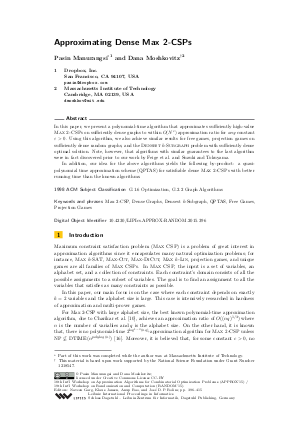Approximating Dense Max 2-CSPs
Authors Pasin Manurangsi, Dana Moshkovitz
-
Part of:
Volume:
Approximation, Randomization, and Combinatorial Optimization. Algorithms and Techniques (APPROX/RANDOM 2015)
Part of: Series: Leibniz International Proceedings in Informatics (LIPIcs)
Part of: Conference: International Conference on Randomization and Computation (RANDOM)
Part of: Conference: International Conference on Approximation Algorithms for Combinatorial Optimization Problems (APPROX) - License:
 Creative Commons Attribution 3.0 Unported license
Creative Commons Attribution 3.0 Unported license
- Publication Date: 2015-08-13
File

PDF
LIPIcs.APPROX-RANDOM.2015.396.pdf
- Filesize: 0.51 MB
- 20 pages
Document Identifiers
Subject Classification
Keywords
- Max 2-CSP
- Dense Graphs
- Densest k-Subgraph
- QPTAS
- Free Games
- Projection Games
Metrics
- Access Statistics
-
Total Accesses (updated on a weekly basis)
0PDF Downloads0Metadata Views
Abstract
In this paper, we present a polynomial-time algorithm that approximates sufficiently high-value Max 2-CSPs on sufficiently dense graphs to within O(N^epsilon) approximation ratio for any constant epsilon > 0. Using this algorithm, we also achieve similar results for free games, projection games on sufficiently dense random graphs, and the Densest k-Subgraph problem with sufficiently dense optimal solution. Note, however, that algorithms with similar guarantees to the last algorithm were in fact discovered prior to our work by Feige et al. and Suzuki and Tokuyama. In addition, our idea for the above algorithms yields the following by-product: a quasi-polynomial time approximation scheme (QPTAS) for satisfiable dense Max 2-CSPs with better running time than the known algorithms.
Cite As Get BibTex
Pasin Manurangsi and Dana Moshkovitz. Approximating Dense Max 2-CSPs. In Approximation, Randomization, and Combinatorial Optimization. Algorithms and Techniques (APPROX/RANDOM 2015). Leibniz International Proceedings in Informatics (LIPIcs), Volume 40, pp. 396-415, Schloss Dagstuhl – Leibniz-Zentrum für Informatik (2015)
https://doi.org/10.4230/LIPIcs.APPROX-RANDOM.2015.396
BibTex
@InProceedings{manurangsi_et_al:LIPIcs.APPROX-RANDOM.2015.396,
author = {Manurangsi, Pasin and Moshkovitz, Dana},
title = {{Approximating Dense Max 2-CSPs}},
booktitle = {Approximation, Randomization, and Combinatorial Optimization. Algorithms and Techniques (APPROX/RANDOM 2015)},
pages = {396--415},
series = {Leibniz International Proceedings in Informatics (LIPIcs)},
ISBN = {978-3-939897-89-7},
ISSN = {1868-8969},
year = {2015},
volume = {40},
editor = {Garg, Naveen and Jansen, Klaus and Rao, Anup and Rolim, Jos\'{e} D. P.},
publisher = {Schloss Dagstuhl -- Leibniz-Zentrum f{\"u}r Informatik},
address = {Dagstuhl, Germany},
URL = {https://drops.dagstuhl.de/entities/document/10.4230/LIPIcs.APPROX-RANDOM.2015.396},
URN = {urn:nbn:de:0030-drops-53149},
doi = {10.4230/LIPIcs.APPROX-RANDOM.2015.396},
annote = {Keywords: Max 2-CSP, Dense Graphs, Densest k-Subgraph, QPTAS, Free Games, Projection Games}
}
Author Details
References
-
S. Aaronson, R. Impagliazzo, and D. Moshkovitz. AM with multiple Merlins. In Computational Complexity (CCC), 2014 IEEE 29th Conference on, pages 44-55, June 2014.

-
N. Alon, W. F. de la Vega, R. Kannan, and M. Karpinski. Random sampling and approximation of max-CSPs. J. Comput. Syst. Sci., 67(2):212-243, September 2003.

-
S. Arora, D. Karger, and M. Karpinski. Polynomial time approximation schemes for dense instances of NP-hard problems. In Proceedings of the Twenty-seventh Annual ACM Symposium on Theory of Computing, STOC'95, pages 284-293, New York, NY, USA, 1995. ACM.

-
B. Barak, M. Hardt, T. Holenstein, and D. Steurer. Subsampling mathematical relaxations and average-case complexity. In Proceedings of the Twenty-second Annual ACM-SIAM Symposium on Discrete Algorithms, SODA'11, pages 512-531. SIAM, 2011.

-
B. Barak, A. Rao, R. Raz, R. Rosen, and R. Shaltiel. Strong parallel repetition theorem for free projection games. In Proceedings of the 12th International Workshop and 13th International Workshop on Approximation, Randomization, and Combinatorial Optimization. Algorithms and Techniques, APPROX/RANDOM'09, pages 352-365, Berlin, Heidelberg, 2009. Springer-Verlag.

-
M. Bellare, O. Goldreich, and M. Sudan. Free bits, PCPs, and nonapproximability - towards tight results. SIAM Journal on Computing, 27(3):804-915, 1998.

-
A. Bhaskara, M. Charikar, E. Chlamtac, U. Feige, and A. Vijayaraghavan. Detecting high log-densities: An O(n^1/4) approximation for densest k-subgraph. In Proceedings of the Forty-second ACM Symposium on Theory of Computing, STOC'10, pages 201-210, New York, NY, USA, 2010. ACM.

-
F. G.S.L. Brandao and A. W. Harrow. Quantum de finetti theorems under local measurements with applications. In Proceedings of the Forty-fifth Annual ACM Symposium on Theory of Computing, STOC'13, pages 861-870, New York, NY, USA, 2013. ACM.

-
M. Braverman, Y. K. Ko, and O. Weinstein. Approximating the best nash equilibrium in n^o(log n)-time breaks the exponential time hypothesis. In Proceedings of the Twenty-Sixth Annual ACM-SIAM Symposium on Discrete Algorithms, SODA'15, pages 970-982. SIAM, 2015.

-
M. Charikar, M. Hajiaghayi, and H. Karloff. Improved approximation algorithms for label cover problems. In ESA, pages 23-34, 2009.

-
U. Feige, D. Peleg, and G. Kortsarz. The dense k-subgraph problem. Algorithmica, 29(3):410-421, 2001.

-
J. Håstad. Some optimal inapproximability results. Journal of the ACM, 48(4):798-859, 2001.

-
S. Khot. Ruling out PTAS for graph min-bisection, densest subgraph and bipartite clique. In Proceedings of the 45th Annual IEEE Symposium on Foundations of Computer Science, FOCS'04, pages 136-145, Washington, DC, USA, 2004. IEEE Computer Society.

-
P. Manurangsi and D. Moshkovitz. Improved approximation algorithms for projection games. In Algorithms – ESA 2013, volume 8125 of Lecture Notes in Computer Science, pages 683-694. Springer Berlin Heidelberg, 2013.

-
D. Moshkovitz. The projection games conjecture and the NP-hardness of ln n-approximating set-cover. In Approximation, Randomization, and Combinatorial Optimization. Algorithms and Techniques - 15th International Workshop, APPROX 2012, volume 7408, pages 276-287, 2012.

-
R. Raz. A parallel repetition theorem. In SIAM Journal on Computing, volume 27, pages 763-803, 1998.

-
R. Shaltiel. Derandomized parallel repetition theorems for free games. Comput. Complex., 22(3):565-594, September 2013.

-
A. Suzuki and T. Tokuyama. Dense subgraph problems with output-density conditions. In Xiaotie Deng and Ding-Zhu Du, editors, Algorithms and Computation, volume 3827 of Lecture Notes in Computer Science, pages 266-276. Springer Berlin Heidelberg, 2005.

